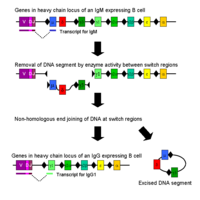
Photo from wikipedia
Objective To better understand the contribution of autoantibodies in RA and the biology of their responses, we evaluated the avidity of the anti-carbamylated protein (anti-CarP) antibody response. Methods The avidity… Click to show full abstract
Objective To better understand the contribution of autoantibodies in RA and the biology of their responses, we evaluated the avidity of the anti-carbamylated protein (anti-CarP) antibody response. Methods The avidity of anti-CarP antibody, ACPA and anti-tetanus toxoid IgG were determined using elution assays. Anti-CarP IgG avidity was measured in sera of 107 RA patients, 15 paired SF and serum samples and 8 serially sampled sera before and after disease onset. Results The avidity of anti-CarP IgG is low compared with the avidity of anti-tetanus toxoid IgG present in the same sera. Likewise, although less pronounced, anti-CarP also displayed a lower avidity as compared with the avidity of ACPA IgG. No difference in anti-CarP IgG avidity is observed between ACPA positive or ACPA negative patients. Anti-CarP IgG avidity is higher in anti-CarP IgM-negative compared with IgM-positive individuals. Furthermore, the anti-CarP avidity in serum is higher than in SF. Using samples of individuals that over time developed RA we observed no anti-CarP avidity maturation in the years before disease onset. In contrast to ACPA avidity, the anti-CarP avidity is not associated with severity of joint destruction. Conclusion The anti-CarP response is of overall low avidity, even lower than the ACPA IgG avidity, and does not show apparent avidity maturation before or around disease onset. Overall, isotype switch and avidity maturation seem to be uncoupled as isotype switch occurs without avidity maturation, pointing towards a commonality in the regulation of both autoantibody responses as opposed to the pathways governing recall responses.
Journal Title: Rheumatology
Year Published: 2018
Link to full text (if available)
Share on Social Media: Sign Up to like & get
recommendations!